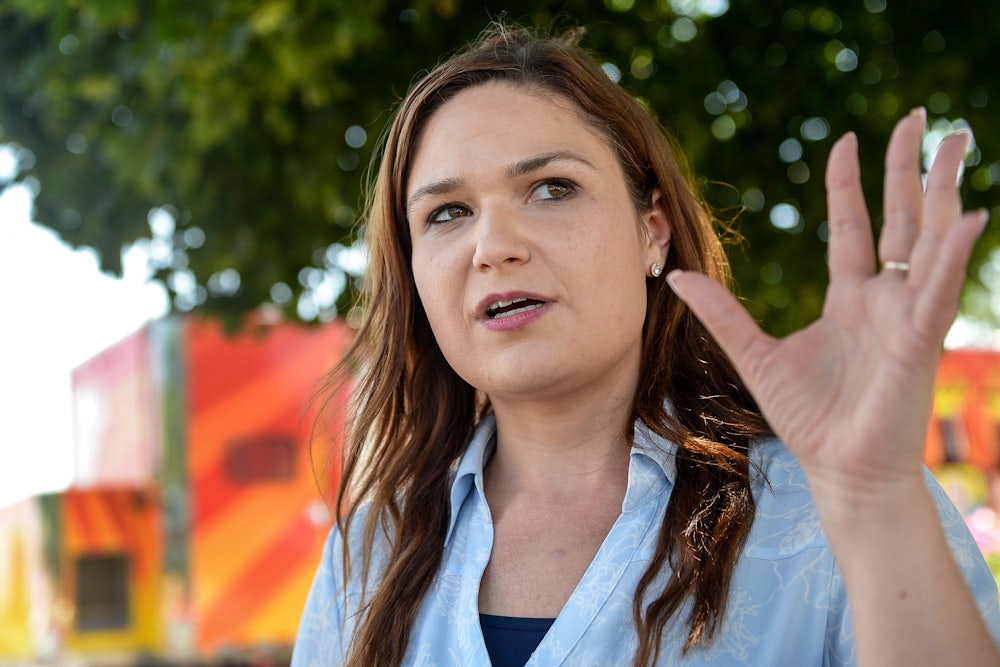Senator Chuck Grassley of Iowa is not exactly the most vulnerable incumbent seeking reelection this year. The octogenarian Republican, whose tenure in the Senate is the second-longest among active members, holds a relatively safe seat. The Cook Political Report does not rate Grassley’s seat as competitive; the race nestled in its “Solid Republican” column. Although he faces a primary challenger, he is expected to prevail in Tuesday’s election, and his odds are looking pretty good against his eventual Democratic opponent in the November general election. In 2016, Grassley defeated Democrat Patty Judge, a former lieutenant governor of the state, by 25 percentage points.
Democratic candidates all over the map are facing the headwinds of a campaign season that would have been historically difficult under normal circumstances: The party holding the White House typically sustains heavy losses in the first midterm after a presidential election. Democratic candidates must also contend with high inflation, rising gas prices, and a president with sinking poll numbers. This will be a particular challenge in Iowa: A March Des Moines Register/Mediacom Iowa Poll found that only 35 percent of Iowan adults approved of President Joe Biden’s job performance.
Since Grassley last won reelection, Iowa has only become increasingly hostile territory for Democrats. Once a bellwether state that twice voted for Barack Obama, Iowa swung sharply to the right in 2016 and 2020. Democrats did slightly better during the 2018 midterm elections, picking up two House seats and coming within three points of victory in the gubernatorial race. But Democratic Representative Abby Finkenauer narrowly lost a tough reelection fight in 2020, and Democrats lost control of another House seat in an open race. Theresa Greenfield failed to unseat Senator Joni Ernst, despite significantly outraising and outspending the Republican incumbent. Donald Trump not only won Iowa a second time, he strengthened his vote share in several counties that he won.
Finkenauer is now seeking redemption as a Senate candidate, vying to become the Democratic nominee to challenge Senator Chuck Grassley in the general election. Grassley is more than an entrenched incumbent, he is an institution: He has been in office since 1981, before Finkenauer was born. Finkenauer, who is 33, has focused her campaign in part on her support for term limits. She has promised to only serve two terms if elected, and expressed support for 12-year limits for members of Congress: two terms for senators, and six for members of the House.
But before she can present herself as a generational counterweight to the 88-year-old Grassley, whom she has characterized as out of touch with his constituents, Finkenauer would need to win the Democratic primary. Mike Franken, a retired Navy admiral who ran for Senate in 2020, and Glenn Hurst, a Minden City Council member, are also seeking the nomination. Franken outraised Finkenauer in the most recent fundraising period and significantly outspent her in TV and social media advertisements. There is limited polling in the race, and the outcome of Tuesday’s primary is unclear. (Finkenauer was briefly kicked off the ballot in April, but was reinstated by the state Supreme Court.)
Grassley’s Democratic opponent may benefit from slackening approval ratings for the longtime senator. A Des Moines Register/Mediacom Iowa Poll from March of last year found that 55 percent of Iowans did not want Grassley to run for reelection. A Des Moines Register/Mediacom Iowa Poll released this past March found that 45 percent of Iowans approved of the way Grassley was conducting his job, compared to 43 percent disapproving. The poll also found that Grassley was viewed favorably by 47 percent of Iowans and unfavorably by 40 percent, the highest unfavorable rating the senator had received in an Iowa poll.
J. Ann Selzer, the president of Selzer & Co., which conducts the Iowa Polls for The Des Moines Register and Mediacom, noted that as recently as January 2009 Grassley’s approval rating was at 75 percent. Grassley’s approval ratings have dipped over the past decade, to the point where almost as many Iowans disapprove of his performance as approve, per the more recent March poll.
“He’s in maybe the best position to be defeated in a long time,” Selzer said. “Now, he does not have a majority approving [of him]. You have to say there’s an opportunity. But that’s without having a very specific candidate name in opposition to him.”
The March 2022 poll also showed that Finkenauer and Franken are unknown to large swaths of the Iowa public. Recent polls have also shown Grassley up significantly in hypothetical matchups with Finkenauer, and even an April poll funded by the Franken campaign found Grassley narrowly ahead.
The Democratic primary has not been a nasty one; the two leading candidates have largely chosen to attack Grassley rather than each other. Hurst has characterized himself as the most progressive candidate in the race, but is expected to come in third in the primary election. Both Finkenauer and Franken have positioned themselves more to the center, highlighting that all-important trait for a candidate facing an uphill fight: electability. Democratic voters may be concerned about Finkenauer’s ability to defeat Grassley in a statewide race, given her loss in a competitive House race in 2020. Finkenauer lost to Republican Ashley Hinson in 2020 by three percentage points, although she did outperform Biden in her district.
In 2020, Biden only won six of Iowa’s 99 counties; just two years earlier, the Democratic gubernatorial candidate won 11 counties. However, the counties won by Biden contain urban population centers, and while many of the more rural counties shrunk in population between the 2010 and 2020 Census, five of the counties that Biden won increased their populations. In potentially good news for Democrats, Dallas County, west of Des Moines—which supported Trump by two percentage points—saw the highest population growth in the state.
It’s not impossible for a Democrat to win a statewide election in Iowa in the modern era. The state attorney general, auditor, and treasurer are all Democrats; all are also up for reelection this year. (State Attorney General Tom Miller was first elected in 1978 and did not face a Republican challenger in the general election in 2018, but he will face Republican Brenna Bird in this year’s election.)
But historically speaking, Democrats in Iowa have a harder time turning out voters than Republicans, at least in presidential election years. In 2016, registered Republicans had a seven-point turnout advantage. That gap lowered to four percentage points in 2020, with 85 percent of registered Republicans showing up to vote, compared to 81 percent of Democrats. But if Republicans are feeling especially motivated in the midterms, and Democrats especially unmotivated, it could spell danger for Grassley’s eventual opponent.
A wild card in the Senate race may be the upcoming Supreme Court decision on Roe v. Wade. Unlike many other Republican-led states, Iowa does not have a trigger law that would outlaw abortion if Roe is overturned. In 2018, the Iowa Supreme Court found that abortion is protected under the state constitution; however, the state’s high court is currently considering a case that could overturn that ruling with a decision expected this month. Republican Governor Kim Reynolds has appointed four of the court’s seven justices since 2018, and six justices total were appointed by Republicans.
If the U.S. Supreme Court overturns Roe, and the Iowa Supreme Court finds that the right to an abortion is not protected, this could motivate voters. Grassley played a pivotal role in the confirmation of three conservative justices to the Supreme Court. As the former chair of the Senate Judiciary Committee, Grassley blocked Merrick Garland’s nomination to the Supreme Court in 2016, and then supported all three of the judges nominated by President Donald Trump—including Amy Coney Barrett, who was confirmed just weeks before the 2020 election. Grassley’s Democratic opponent will be able to point to these actions. However, there is no guarantee that this will prove to be decisive in the end—after all, Grassley will have the chance to fire up his own base by touting his record in helping confirm conservative justices.
If Grassley’s worried about blowback from Roe, he hasn’t always shown it. In a rally with Trump in Iowa last year, Grassley said the 6–3 conservative majority on the court was “very, very important to save the Constitution and save the country.” “President Trump ran on a platform of making sure that we had strict … conservative justices on the Supreme Court,” Grassley said at the time. “And there’s three of them that are there and I was happy to chair the committee to get them there.”
Still, after the draft decision revealing that the court might overturn Roe was leaked last month, Grassley sounded a cautious note. In a call with Iowa reporters, the senator was reluctant to take credit for the apparent decision, The Des Moines Register reported—perhaps an indication that the political ramifications of overturning Roe might not be an unmitigated good.
“I’m focused on getting judges that apply the law, not the way they want it, but the ways that Congress intended when we wrote it,” Grassley said. “And that’s all you can do.”
A September 2021 Des Moines Register/Mediacom Iowa Poll found that a majority of Iowans believe abortion should be legal in all or most cases. Democrats have the edge among women in Iowa, with more women registered as Democrats in the state in the 2020 elections than Republicans, although a slightly higher percentage of Republican women turned out to vote. It’s possible that Democratic women could turn out in higher numbers, depending on what the highest federal and state courts decide.
All three Democratic Senate candidates agreed in a recent debate that Congress should pass legislation to protect a woman’s right to an abortion. They have also called for ending the filibuster, the legislative maneuver that allows the minority party to block legislation unless it receives 60 votes to advance.










